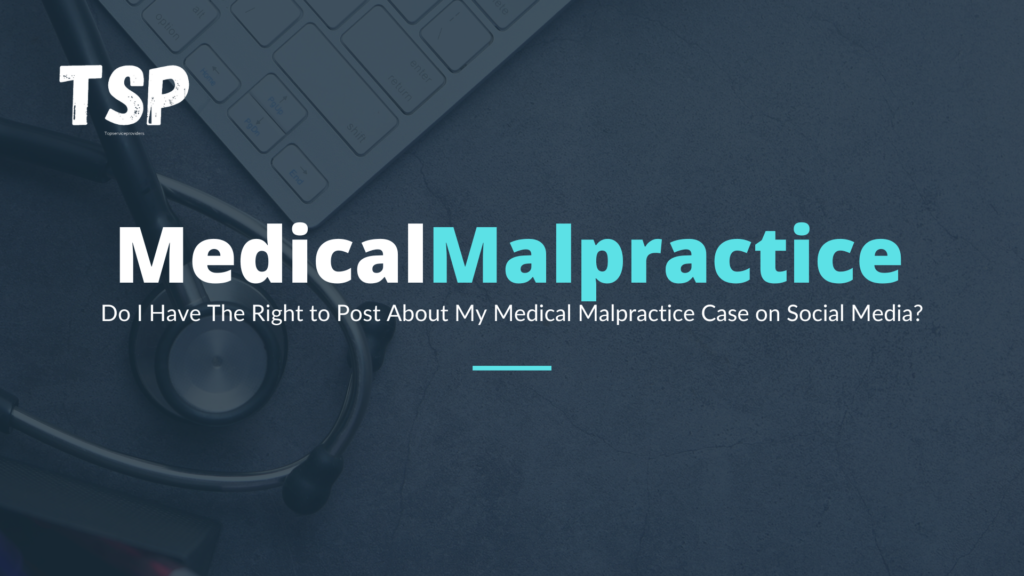
Do I Have The Right to Post About My Medical Malpractice Case on Social Media?

If you have been injured due to medical malpractice, you may be considering filing a lawsuit. There are several concerns that people may have when considering a medical malpractice lawsuit. Some of the most common concerns include privacy, social media, and communication with your attorney.
While this is a complex process, there are a few things you can do to protect your case. One of the most important things is to be careful about what you post on social media.
Can I Post on Social Media About My Medical Malpractice Case?
Yes, you do have the right to post about your medical malpractice case on social media. However, it is ill-advised to do so. Social media posts can be used against you in a medical malpractice lawsuit. Even seemingly innocent posts, such as complaining about your medical care, could be used to damage your case.
It is important to remember that anything you post on social media is public. Even if you set your privacy settings to private, there is no guarantee that your posts will not be seen by the other party in the lawsuit.
Social media posts can also be easily subpoenaed by the court. So, if you are involved in a medical malpractice lawsuit, it is best to avoid posting about your case on social media altogether. If you have any questions about what you can and cannot post, you should speak to your attorney.
Can I Post My Injury Images on Social Media?
You should avoid posting images or videos of your injuries on social media. This can compromise your privacy and be used against you in court. There are legal concerns to be considered as well. Since you are making a legal claim that you have suffered harm as a result of a healthcare provider’s negligence, posting images and videos of your injuries on social media could undermine your case or give the defense sufficient ammunition to argue that your injuries are not as severe as you claim.
Posting your injuries could also attract unwanted attention and unnecessary questions may arise about your case from your social media following. This could include friends, family members, or even strangers who may ask for details or speculate about your case. This could be distracting and add stress to an already difficult situation.
It is always best to consult your attorney to advise you on what to share and what not to share on social media during a medical malpractice case. The medical malpractice attorneys at KDLM can help you understand the potential risks and consequences of posting about your injuries online and guide you on how to protect your privacy and your case.
It is also important to be careful about what you say to others about your case. Even if you are talking to a friend or family member, anything you say could be overheard or recorded. It is best to avoid discussing your case with anyone other than your attorney.
Legalities For a Medical Malpractice Case
Medical malpractice is a complex and highly specialized area of law that requires a deep understanding of medical terminology, procedures, and standards of care.
At KDLM, our medical malpractice attorneys have the expertise and knowledge necessary to help you pursue justice and compensation for the harm you have suffered. We understand the legal complexities involved in medical malpractice lawsuits and can advise you on the legalities of filing a claim.
One of the key legalities to consider when filing a medical malpractice lawsuit is the statute of limitations. The statute of limitations is the time limit for filing a lawsuit. In New York, the statute of limitations for medical malpractice is 3 years from the date of the alleged malpractice to file suit. However, there are a few exceptions to this rule that your attorney can discuss with you if necessary.
Another important legal consideration is the burden of proof required to win a medical malpractice case. This can be a complex and challenging process as medical malpractice lawsuits require a high burden of proof which requires you and your attorney to demonstrate that a healthcare provider’s actions or negligence caused your injury or worsened your condition.
Attorney-Client communication
Attorney-client communication is a secret and protected by the attorney-client privilege. This means that any communication between clients and their attorney is confidential.
Your online communication could impact the attorney-client privilege. For example, if you post about your case on social media, it could potentially waive the attorney-client privilege and make those communications discoverable in court.
Additionally, social media use can become a topic of discussion during a deposition. During a deposition, the opposing counsel may ask questions about your social media activity, including any posts or messages related to your medical malpractice case. If you are not careful, your social media activity could potentially compromise your claims and result in losing your case.
Be cautious about what you post on social media and follow the advice of your attorney regarding social media use during a medical malpractice case. Your attorney can advise you on what is and is not appropriate to post online and can help you protect your attorney-client privilege.
Precautions for Medical Malpractice Lawsuits
In summary, here are some specific precautions you should take when it comes to social mediayou’re your medical malpractice case.
The things you should not post on social media if you are involved in a medical malpractice lawsuit:
- Information about your injuries or medical condition
- Information about your treatment or care
- Information about your medical providers
- Information about your lawsuit
- Complaints about your medical care
- Photos and videos
By following these tips, you can protect your medical malpractice case and increase your chances of success.
Here are some additional tips for protecting your medical malpractice case:
Keep a journal of your medical care and treatment. This will help you remember important details and provide documentation of your injuries.
Get copies of all of your medical records. This includes your medical history, test results, and treatment notes.
Talk to an experienced medical malpractice attorney at KDLM. An attorney can help you understand your legal rights and options and represent you in a lawsuit.